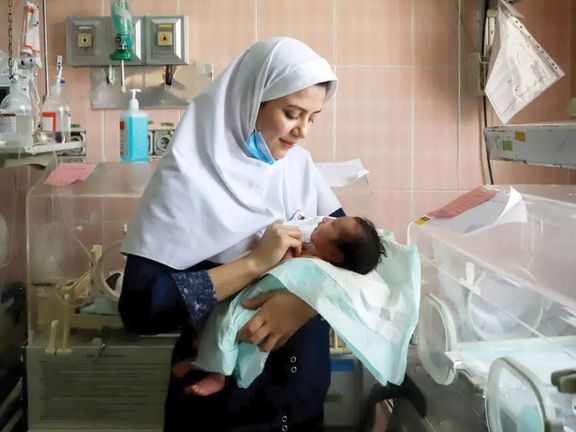Eggs, sperm and wombs for sale on Iran's reproductive black market

A widespread network of brokers online are working to facilitate a trade in eggs, sperm, embryos and surrogate wombs, Iranian newspaper Ham-Mihan reported in an investigation.
The report on Wednesday details how the transactions are advertised using coded language such as "work from home" on platforms like Divar - a popular Iranian online classifieds site - Instagram and Telegram.
Iran's lack of a clear legal framework governing the donation of reproductive cells and embryos has allowed the brokers to flourish, with some even collaborating directly with doctors.
The advertisements primarily target young adults aged 18 to 31, with varying prices, Ham-Mihan added. Surrogacy typically costs between 3 and 4 billion rials (approximately $3,750 to $5,000), plus an additional 90 million rials (less than $110) paid monthly to the surrogate until delivery.
In May, Tejarat News, another Iranian news outlet, reported a wider range for surrogacy costs, from 4 to 9 billion rials (roughly $5,000 to $11,000). Citing a gynecologist and a maternity ward nurse, it reported that individuals born in the 1990s are the most common surrogates.
Ham-Mihan reported that sellers are required to provide a physician-certified ultrasound confirming the size and reserve of each ovary, along with a certified copy of their national identity card obtained through a designated notary public.
For married donors written spousal consent is mandatory, while unmarried donors must provide a divorce or death certificate. A psychiatric evaluation is also required for all donors.
Zahra Ahmadi, director of social work at the Royan Infertility Treatment Center, a leading facility in Iran, told Ham-Mihan that brokers and intermediaries profit from the unregulated market.
She emphasized that donors can bypass these intermediaries by contacting the Royan Center directly for anonymous donations, dealing directly with the center rather than individual recipients. Ahmadi added that direct egg donors at Royan receive 160 million rials (about $200) per donation under a formal contract.
The report by Ham-Mihan also connects this trade to a broader trend of organ selling in Iran, which has sharply increased in recent years, even involving buyers in neighboring countries.
In June 2023, Hossein Biglari, head of the Kermanshah Kidney Patients Support Association, reported that kidneys were being sold in the province for negotiated prices between 2.5 billion rials (approximately $3,000 at current exchange rates).
Iranian media reports over the past two years have documented the growing prevalence of advertisements for liver, bone marrow, and cornea transplants, as well as sperm and egg donations appearing publicly alongside the sale of kidneys. Some advertisements even offer hearts for sale.
In May 2023, the Jahan-e-Sanat daily reported that some brokers facilitate the sale of organs in neighboring countries like the United Arab Emirates, Turkey and Iraq, fetching prices between of up to $15,000 for sellers.